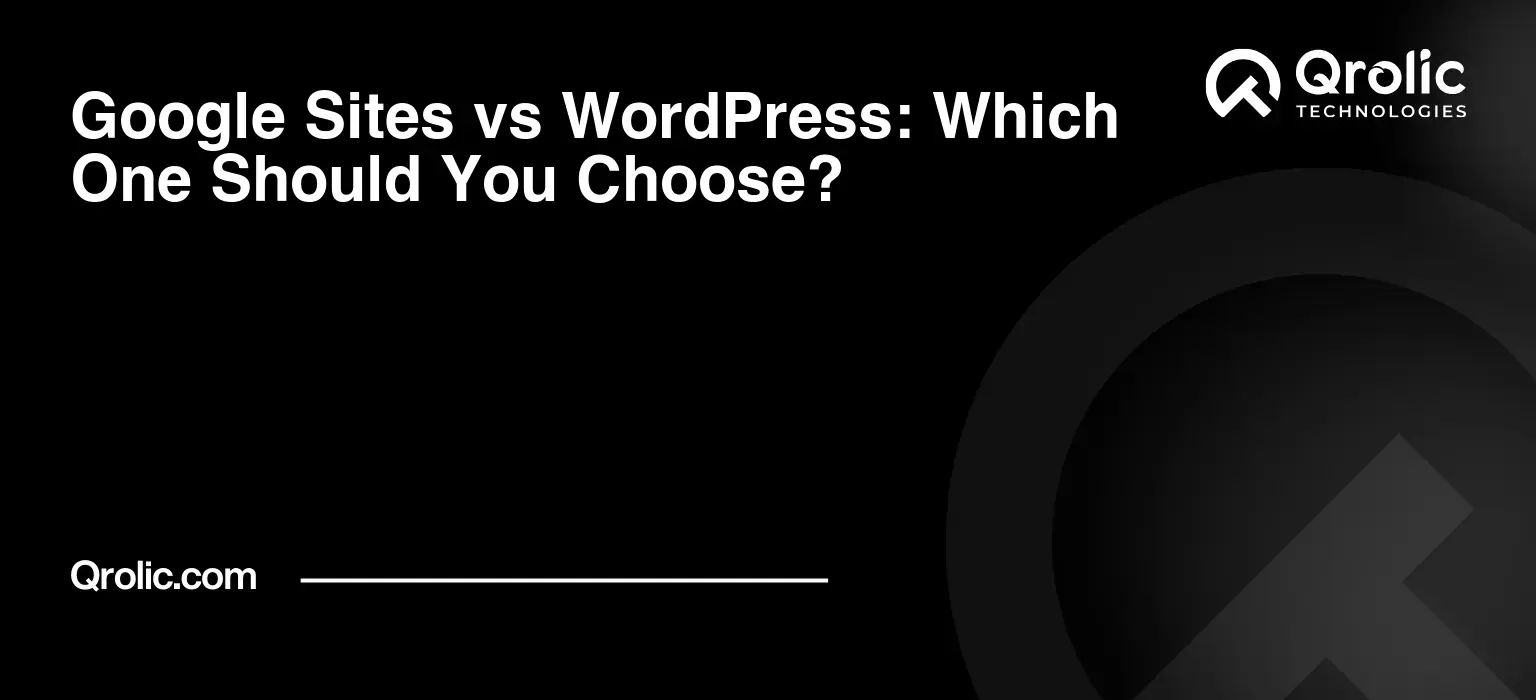Choosing the right platform for your website feels like picking the right tool for a job – get it wrong, and you’re in for a world of frustration. Two titans often clash in the website-building arena: Google Sites and WordPress. Both promise to help you create an online presence, but they cater to vastly different needs and skill levels. This article dives deep into a head-to-head comparison, breaking down everything you need to know to make an informed decision and find the best website builder for your unique situation. We’ll explore everything from ease of use to website platforms comparison, SEO capabilities, and cost, ensuring you understand the strengths and weaknesses of each platform.
Quick Summary:
- Google Sites is for simple, quick, free, basic websites.
- WordPress offers power, flexibility, and scalability for complex sites.
- Choose based on your needs: ease-of-use or full control.
- Good website performance is always crucial.
Table of Contents
- What Exactly Are Google Sites and WordPress?
- Google Sites: Simplicity at Its Finest
- WordPress: Power and Flexibility Unleashed
- Google Sites vs. WordPress: A Detailed Comparison
- 1. Ease of Use: The Beginner’s Paradise vs. The Power User’s Playground
- 2. Design and Customization: Where WordPress Truly Shines
- 3. Functionality and Features: Plugins vs. Integrations
- 4. SEO (Search Engine Optimization): Making Your Website Discoverable
- 5. Security: Protecting Your Online Presence
- 6. Pricing: Free vs. Potentially Costly
- 7. Scalability: Growing Your Website Over Time
- 8. Support and Community: Getting Help When You Need It
- Google Sites vs. WordPress: The Summary Table
- When to Choose Google Sites: A Clear Guideline
- When to Choose WordPress: A Clear Guideline
- Beyond the Platforms: The Importance of Website Performance
- Getting Expert Help: Qrolic Technologies and Your Website Journey
- The Final Verdict: Your Needs Determine the Winner
What Exactly Are Google Sites and WordPress?
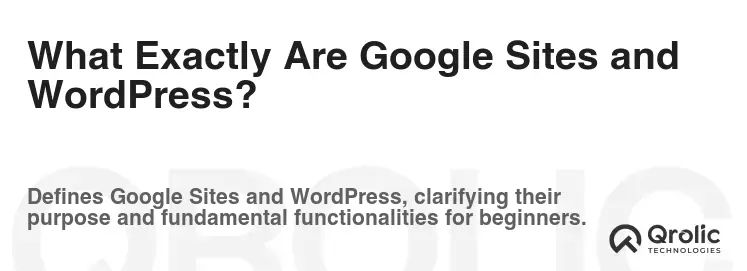
Before we delve into the battle, let’s define our contenders.
Google Sites: Simplicity at Its Finest
Google Sites is a free, web-based website builder offered by Google as part of their Google Workspace suite. Think of it as the “plug-and-play” option. Its drag-and-drop interface is incredibly intuitive, making it a fantastic choice for beginners or anyone needing a simple website up and running quickly. The integration with other Google services like Docs, Sheets, and Slides is seamless, streamlining workflows for collaborative projects.
- Key Takeaway: Google Sites prioritizes ease of use and simplicity, perfect for basic websites and internal projects.
WordPress: Power and Flexibility Unleashed
WordPress, specifically WordPress.org (the self-hosted version), is a powerful and highly customizable content management system (CMS). It’s not just a website builder; it’s a robust platform that allows you to create virtually any type of website imaginable. From simple blogs to complex e-commerce stores and membership sites, WordPress offers unparalleled flexibility. It uses themes and plugins to extend its functionality.
- Key Takeaway: WordPress offers immense power and flexibility but comes with a steeper learning curve and more technical responsibilities.
Google Sites vs. WordPress: A Detailed Comparison
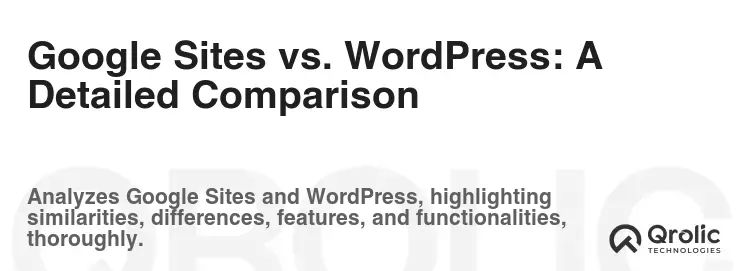
Now, let’s break down the critical differences across various categories:
1. Ease of Use: The Beginner’s Paradise vs. The Power User’s Playground
-
Google Sites: The “No-Code” Champion:
- Drag-and-Drop Simplicity: The intuitive drag-and-drop interface makes it ridiculously easy to add and arrange content. No coding knowledge is required. You select elements from a sidebar and place them directly onto your page.
- Pre-designed Templates: Google Sites offers a selection of pre-designed templates to get you started quickly. These templates provide a basic structure that you can customize with your own content and branding.
- Limited Customization: While easy to use, customization options are limited. You’re restricted to the features and design elements provided by Google. This can be frustrating if you need a very specific look and feel.
- Team Collaboration Simplified: Editing a Google Site is as easy as editing a Google Doc. Multiple users can work on the same site simultaneously, making it perfect for team projects.
- Example Scenario: Imagine a small non-profit organization that needs a simple website to showcase their mission and collect donations. Google Sites would be perfect because it’s easy for non-technical staff to update and manage.
-
WordPress: A Learning Curve, but Infinite Possibilities:
- Steeper Learning Curve: WordPress has a steeper learning curve than Google Sites. You’ll need to familiarize yourself with the WordPress dashboard, themes, and plugins.
- Theme Selection is Extensive: Thousands of free and premium themes are available, offering a vast range of design options. You can find themes specifically designed for different industries and niches.
- Plugin Power: Plugins are where WordPress shines. They add functionality to your website, from contact forms and SEO tools to e-commerce capabilities and membership management systems.
- Code Customization: If you know HTML, CSS, and PHP, you can customize virtually every aspect of your WordPress site. This level of control is unmatched by Google Sites.
- Occasional Technical Tweaks: You’ll likely need to troubleshoot occasional technical issues, such as plugin conflicts or theme compatibility problems.
- Example Scenario: A photographer wants to create a professional portfolio website with a blog and an online store to sell prints. WordPress is the ideal choice because it offers the flexibility and functionality needed to showcase their work and run an e-commerce business.
Winner: Google Sites wins for sheer ease of use, especially for beginners. WordPress wins for customization and potential. If your focus is getting something basic live as quickly as possible with minimal technical hurdles, Google Sites is the better bet. If you’re looking for a website you can mold exactly to your vision and expand over time, WordPress is the way to go.
2. Design and Customization: Where WordPress Truly Shines
-
Google Sites: Limited but Functional:
- Basic Theme Options: Google Sites offers a handful of basic themes with limited customization options. You can change colors, fonts, and add your logo, but you’re largely restricted to the theme’s pre-defined structure.
- No Direct Code Access: You can’t directly edit the HTML or CSS of your Google Site. This limits your ability to make advanced design changes.
- Responsiveness is Built-In: Google Sites automatically optimizes your website for different devices, ensuring it looks good on desktops, tablets, and smartphones.
- Example: Creating a simple internal company wiki with consistent branding across all pages. The limited customization isn’t an issue here; consistency and ease of access are the priorities.
-
WordPress: Limitless Design Possibilities:
- Themes Galore: Thousands of free and premium WordPress themes are available, offering a wide range of design styles and layouts.
- Page Builders: Drag-and-drop page builders like Elementor, Beaver Builder, and Divi make it easy to create custom page layouts without coding.
- Code Customization (Optional): If you know code, you can customize virtually every aspect of your WordPress theme.
- Responsiveness is Theme-Dependent: You need to choose a responsive WordPress theme to ensure your website looks good on all devices. Most modern themes are responsive by default, but it’s always a good idea to check.
- Example: Building a highly branded, visually stunning e-commerce store with unique product layouts and interactive elements. WordPress, combined with a powerful theme and page builder, can make this a reality.
Winner: WordPress unequivocally wins for design and customization. It offers vastly more control over the look and feel of your website, allowing you to create a truly unique and professional online presence.
3. Functionality and Features: Plugins vs. Integrations
-
Google Sites: Basic Integrations:
- Seamless Google Integration: Google Sites seamlessly integrates with other Google services like Google Docs, Sheets, Slides, Forms, and Maps. This makes it easy to embed these resources directly into your website.
- Limited Third-Party Integrations: Google Sites offers limited third-party integrations. You can embed code from other websites, but the options are relatively restricted.
- Basic Functionality: Google Sites provides basic functionality for creating pages, adding content, and organizing your website. However, it lacks advanced features like e-commerce capabilities or membership management systems.
- Example: Embedding a Google Form for collecting feedback from website visitors. This is a simple and effective way to gather information.
-
WordPress: The Plugin Paradise:
- Plugins for Everything: WordPress has a plugin for almost anything you can imagine. From SEO tools and contact forms to e-commerce solutions and membership management systems, plugins extend the functionality of your website.
- Third-Party Integrations Abound: WordPress integrates with a vast range of third-party services, including payment gateways, email marketing platforms, social media networks, and CRM systems.
- Scalability: WordPress can scale to handle even the most complex websites. With the right plugins and hosting, you can build a website that can handle large amounts of traffic and data.
- Potential for Plugin Conflicts: Installing too many plugins can sometimes lead to conflicts or performance issues. It’s important to choose plugins carefully and keep them updated.
- Example: Setting up an online store with WooCommerce, a popular WordPress e-commerce plugin. This allows you to sell products, manage inventory, and process payments directly from your website.
Winner: WordPress triumphs in functionality and features, thanks to its extensive plugin ecosystem. The ability to add virtually any feature you need makes WordPress a highly versatile platform.
4. SEO (Search Engine Optimization): Making Your Website Discoverable
-
Google Sites: Basic SEO Capabilities:
- Mobile-Friendly: Google Sites are inherently mobile-friendly, a crucial factor for SEO.
- Automatic Sitemap Submission: Google Sites automatically submits a sitemap to Google Search Console, helping Google crawl and index your website.
- Limited SEO Customization: You have limited control over SEO elements like meta descriptions, alt tags, and URL structures.
- Dependent on Google’s Algorithm: Your website’s performance in search results is largely dependent on Google’s algorithm.
- Example: Creating a website for a local business with basic information and contact details. Google Sites can help the website rank for local searches.
-
WordPress: SEO Powerhouse:
- Full SEO Control: WordPress gives you full control over all aspects of your website’s SEO. You can customize meta descriptions, alt tags, URL structures, and more.
- SEO Plugins: Powerful SEO plugins like Yoast SEO and Rank Math provide tools and guidance to optimize your website for search engines.
- Content Marketing Focus: WordPress is ideal for content marketing, allowing you to create blog posts, articles, and other content that attracts search engine traffic.
- Constant Need for Optimization: SEO requires ongoing effort and optimization to maintain and improve your website’s ranking.
- Example: Developing a comprehensive content marketing strategy to attract organic traffic to a blog focused on personal finance. WordPress, combined with SEO plugins and high-quality content, can drive significant traffic.
Winner: WordPress reigns supreme in SEO. The level of control and the availability of powerful SEO plugins make it the ideal platform for maximizing your website’s visibility in search results.
5. Security: Protecting Your Online Presence
-
Google Sites: Google’s Security Umbrella:
- Managed Security: Google handles the security of your Google Site, including updates, backups, and malware protection.
- Less Vulnerable to Attacks: Because Google manages the underlying infrastructure, Google Sites is generally less vulnerable to security threats than WordPress sites.
- Limited Control: You have limited control over the security settings of your Google Site. You rely on Google to keep your website safe.
- Example: A small internal team using Google Sites to share sensitive documents. The team benefits from Google’s robust security infrastructure.
-
WordPress: Security Responsibility:
- Self-Managed Security: You are responsible for the security of your WordPress website, including updates, backups, and malware protection.
- Vulnerable to Attacks: WordPress sites are a popular target for hackers, making it crucial to implement security measures.
- Security Plugins: Security plugins like Wordfence and Sucuri Security can help protect your website from attacks.
- Regular Updates are Critical: Keeping your WordPress core, themes, and plugins updated is essential for maintaining security.
- Example: An e-commerce store using WordPress to process online payments. The store owner must implement robust security measures to protect customer data and prevent fraud.
Winner: Google Sites offers a more secure experience due to Google’s managed infrastructure. However, with proper security measures and vigilance, WordPress can also be secured effectively.
6. Pricing: Free vs. Potentially Costly
-
Google Sites: Free (with Limitations):
- Free to Use: Google Sites is free to use with a Google account.
- Storage Limitations: The storage space for your Google Site is limited to the storage space available in your Google account.
- No Custom Domain (Free): You can use a Google Sites subdomain (sites.google.com/view/yourwebsite), but you need a paid Google Workspace account to use a custom domain.
- Hidden Costs (Professional Use): For professional use, a Google Workspace subscription is generally required, adding to the cost.
- Example: A student creating a simple portfolio website for a class project. They can use Google Sites for free without incurring any additional costs.
-
WordPress: Free (but with Costs):
- WordPress Software is Free: The WordPress software itself is free to download and use.
- Hosting Costs: You need to pay for web hosting to host your WordPress website. Hosting costs vary depending on the provider and the type of hosting you choose.
- Domain Name Costs: You need to purchase a domain name for your website. Domain names typically cost around $10-$20 per year.
- Theme and Plugin Costs (Optional): While there are many free themes and plugins available, you may want to purchase premium themes and plugins for additional features and support.
- Maintenance Costs: You may need to pay for website maintenance services, such as updates, backups, and security monitoring.
- Example: A business owner launching a professional website with a custom domain and premium theme. They will need to pay for hosting, a domain name, and potentially a premium theme.
Winner: Google Sites is the clear winner in terms of initial cost, as it’s free to use with a Google account. However, for professional use with a custom domain, the cost difference narrows, and WordPress can be more cost-effective in the long run, especially if you’re comfortable managing the technical aspects yourself.
7. Scalability: Growing Your Website Over Time
-
Google Sites: Limited Scalability:
- Best for Simple Websites: Google Sites is best suited for simple websites with limited content and functionality.
- Difficult to Scale: It can be difficult to scale a Google Site as your needs grow. The limited customization and functionality can become restrictive.
- Not Ideal for Complex Projects: Google Sites is not ideal for complex projects that require advanced features or a large amount of content.
- Example: A small community group using Google Sites to create a basic website to share information about their events. As the group grows and their needs become more complex, they may need to migrate to a more scalable platform.
-
WordPress: Highly Scalable:
- Built for Growth: WordPress is designed to be highly scalable. You can add more content, features, and functionality as your website grows.
- Handles Large Traffic Volumes: With the right hosting and optimization, WordPress can handle large volumes of traffic.
- Suitable for Complex Projects: WordPress is suitable for complex projects that require advanced features, such as e-commerce stores, membership sites, and online courses.
- Scalability Requires Planning: Scaling a WordPress website effectively requires careful planning and optimization.
- Example: An online magazine using WordPress to publish articles, videos, and podcasts. WordPress can handle the large volume of content and traffic generated by the magazine.
Winner: WordPress wins hands down in scalability. Its flexible architecture and extensive plugin ecosystem make it the ideal platform for websites that need to grow and evolve over time.
8. Support and Community: Getting Help When You Need It
-
Google Sites: Limited Support:
- Online Documentation: Google provides online documentation for Google Sites.
- Community Forums: You can find help in Google’s community forums.
- Limited Direct Support: Direct support from Google is limited to paid Google Workspace subscribers.
- Reliance on Self-Help: You’ll primarily rely on self-help resources and community forums for support.
- Example: A user encountering an issue with embedding a Google Doc in their Google Site. They can search for help in Google’s online documentation or ask for assistance in the community forums.
-
WordPress: Vast Community and Resources:
- Extensive Online Resources: A vast amount of online resources are available for WordPress, including tutorials, articles, and videos.
- Large Community Forums: WordPress has a large and active community of users and developers who are willing to help.
- Developer Support (Paid): You can hire WordPress developers for custom development or support.
- Theme and Plugin Support: Most premium themes and plugins come with dedicated support from the developers.
- Example: A user experiencing a conflict between two WordPress plugins. They can search for solutions online, ask for help in the WordPress community forums, or contact the plugin developers for support.
Winner: WordPress offers significantly better support and community resources. The vast online resources and the active community make it easier to find solutions to any problems you encounter.
Google Sites vs. WordPress: The Summary Table
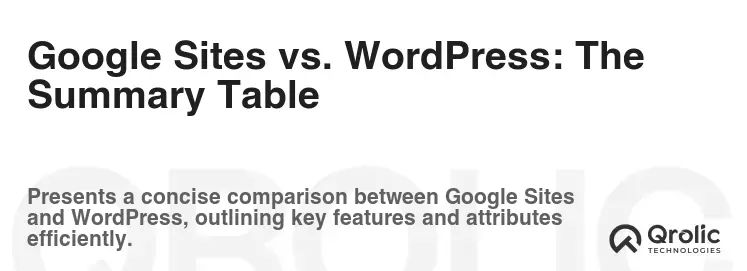
| Feature | Google Sites | WordPress |
|---|---|---|
| Ease of Use | Very Easy (Drag-and-Drop) | Moderate (Steeper Learning Curve) |
| Design | Limited Customization | Highly Customizable |
| Functionality | Basic Integrations | Extensive Plugins |
| SEO | Basic Capabilities | Powerful SEO Tools |
| Security | Managed by Google | Self-Managed (Requires Vigilance) |
| Pricing | Free (with limitations) | Free (but with Hosting and Domain Costs) |
| Scalability | Limited | Highly Scalable |
| Support | Limited | Vast Community and Resources |
When to Choose Google Sites: A Clear Guideline
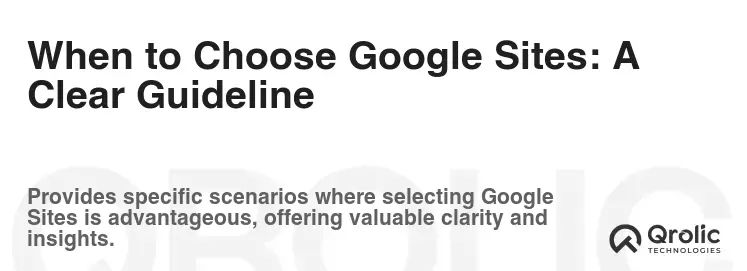
Google Sites is the ideal choice if:
- You need a simple website quickly and easily.
- You’re not tech-savvy and want a “no-code” solution.
- You heavily rely on Google Workspace apps and want seamless integration.
- You need a collaborative platform for team projects.
- You have limited budget and don’t need advanced features.
- Examples: Internal company wikis, small event websites, basic online portfolios, classroom websites.
When to Choose WordPress: A Clear Guideline
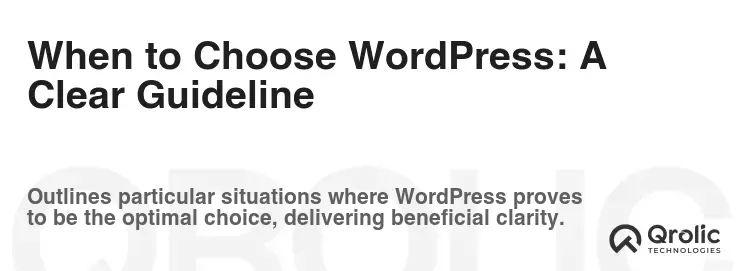
WordPress is the right choice if:
- You need a highly customizable and scalable website.
- You want full control over your website’s design and functionality.
- You need advanced features like e-commerce, membership, or online courses.
- You want to optimize your website for search engines (SEO).
- You’re willing to invest time and effort in learning WordPress.
- You plan to grow your website over time.
- Examples: Blogs, e-commerce stores, business websites, online magazines, membership sites, online courses.
Beyond the Platforms: The Importance of Website Performance
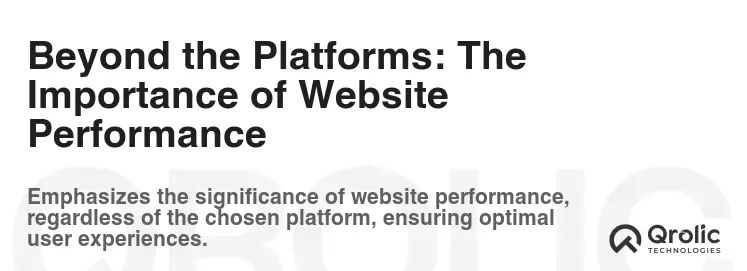
No matter which platform you choose, website performance is critical. A slow-loading website can frustrate visitors and damage your search engine rankings. Here are some tips to improve website performance:
- Optimize Images: Compress images to reduce file size without sacrificing quality.
- Choose a Fast Hosting Provider: A reliable and fast hosting provider is essential for website performance.
- Use a Content Delivery Network (CDN): A CDN distributes your website’s content across multiple servers, reducing latency and improving loading times.
- Cache Your Website: Caching stores static versions of your website’s pages, reducing the load on your server.
- Minimize HTTP Requests: Reduce the number of HTTP requests by combining files and optimizing code.
Getting Expert Help: Qrolic Technologies and Your Website Journey

Building and maintaining a successful website can be challenging, especially if you’re not tech-savvy. That’s where experts like Qrolic Technologies (https://qrolic.com/) come in. Qrolic Technologies offers a range of website development and digital marketing services to help you achieve your online goals.
- Website Development: Qrolic Technologies can help you build a custom website that meets your specific needs, whether you choose Google Sites or WordPress.
- SEO Services: Qrolic Technologies can help you optimize your website for search engines, improving your visibility and driving traffic.
- Digital Marketing: Qrolic Technologies offers a range of digital marketing services, including social media marketing, email marketing, and pay-per-click advertising, to help you reach your target audience.
- Website Maintenance: Qrolic Technologies can provide ongoing website maintenance services, including updates, backups, and security monitoring, to keep your website running smoothly.
Whether you need help with website design, development, SEO, or digital marketing, Qrolic Technologies has the expertise and experience to help you succeed online.
The Final Verdict: Your Needs Determine the Winner

There’s no single “best” platform in the website platforms comparison; the right choice depends entirely on your individual needs and priorities.
- Choose Google Sites if you prioritize simplicity, ease of use, and seamless integration with Google Workspace.
- Choose WordPress if you prioritize customization, flexibility, and scalability, and are willing to invest the time and effort to learn the platform.
Ultimately, the best way to decide is to try both platforms! Google Sites is free to use, and many hosting providers offer one-click WordPress installations. Experiment, explore, and see which platform feels like the best fit for your vision. Good luck! Remember, best website builder is relative to your specific requirements.
